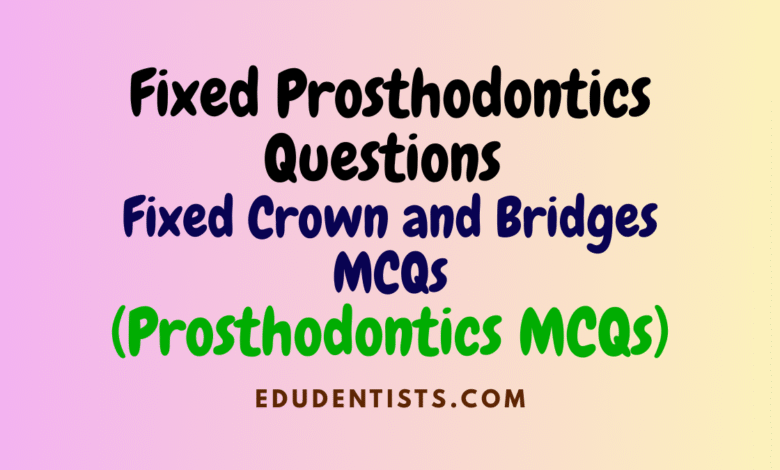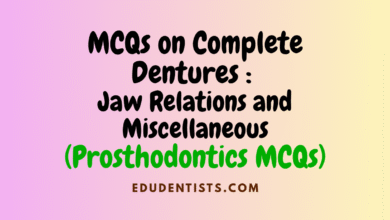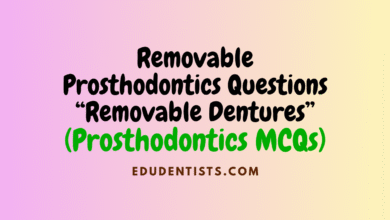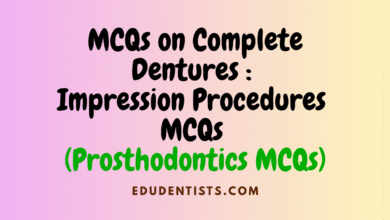Prosthodontics MCQs
Fixed Prosthodontics Questions _ Fixed Crown and Bridges MCQs _ Dental MCQs
Fixed Prosthodontics Questions

Fixed Prosthodontics Questions _ Fixed MCQs _ Dental MCQs
- Ante’s law is followed in the construction of:
A. Fixed partial denture
B. Removable partial denture
C. Complete denture
D. Obturator - In FPD retention is provided mainly by:
A. Cement
B. Functional cusp beveling
C. Parallel wall
D. Proximal slice - In the case of pier abutment, the male compartment is placed on :
A. The mesial side of pontic
B. The mesial side of the abutment
C. The distal side of the abutment
D. The distal side of pontic - The function of “functional cusp bevel “ is to provide:
A. Marginal integrity
B. Structural durability
C. Retention and resistance
D. Periodontal preservation - The minimal crown root ratio for FPD is:
A. 1:1
B. 2:1
C. 2:3
D. 1:2 - What is the function of a pontic?
A. Restore tooth function
B. Restore tooth form
C. Biologically acceptable
D. All of the above - Which of the following pontic design is non-mucosal type?
A. Ridge-lap
B. Sanitary
C. Modified ridge-lap
D. All of the above - What is PerelPontic?
A. Ovate
B. Hygienic
C. Conical
D. Modified sanitary - Which is the first layer of porcelain applied on to metal in PFM crowns?
A. Opaque
B. Body
C. Incisal
D. Both (A) and (B) - Prolonged sensitivity to heat, cold and pressure after cementation of a crown or a fixed partial denture is usually related to:
A. Occlusal trauma
B. Improper cementation
C. Impingement on marginal gingiva
D. Both (A) and (B) - Which is the unit of FPD that attaches an abutment to the suspended unit?
A. Connector
B. Abutment
C. Pontic
D. Retainer - Why are metallic oxides added in porcelain?
A. Increase strength
B. Provide color
C. Improve bonding with metal
D. All of the above - The porcelain-metal bond is:
A. Chemical
B. Mechanical
C. Both (A) and (B)
D. None of the above - The use of porcelain laminates is indicated for:
A. Teeth in parafunction
B. Heavily restored teeth
C. Closure of 1 mm diastema
D. Lower anterior teeth - What is Dicor?
A. Castable ceramic
B. Mitavite
C. Vitallium
D. Vita ceramic - Porcelain jacket crown can best tolerate which among the following forces?
A. Compressive forces
B. Shearing stress
C. Tensile forces
D. None of the above - The porcelain constituent that fuses at firing temperature and forms a matrix is _______:
A. Kaolin
B. Quartz
C. Feldspar
D. Aluminum Oxide - The tissue displacement is commonly needed to obtain:
A. Adequate access to the prepared tooth
B. To expose all necessary surfaces, both prepare not prepared
C. Both of the above
D. None of the above - Ideal dimension for the luting agent space is:
A. 0-20 microns
B. 20-40 microns
C. 40-80 microns
D. 80-120 microns - The central incisors are generally found to be _______ mm anterior to a line bisecting the incisive papilla:
A. 8 to 10 mm
B. 6 to 8 mm
C. 4 to 6 mm
D. 5 to 7mm - Flux is used during casting to:
A. Remove the oxides formed on the gold alloy
B. Lower the melting point
C. Replace casting wax
D. Speed the burnout process - The Silver plated dyes use an electrolytic bath of:
A. Silver fluoride
B. Silver Cyanide
C. Silver bromide
D.Silver Iodide - Which of the following describes the requirements of a sprue?
A. To lead the molten metal into the mold cavity with as much turbulence as possible.
B. To be as long as possible in order to speed the flow of gold into the mold cavity
C. To have the thinnest diameter possible to ensure that sprue solidifies before the wax pattern
D. To be smooth, with no sharp corners and to funnel into the thickest portion of the wax pattern - Allowing the gypsum investment to be heated over 700 will result in:
A. Breakdown of CaCo, which is harmful to gold
B. Breakdown of Na So, which is harmful to gold
C. Breakdown of Ca So, which is harmful to gold
D. No breakdown products - Ferrule effect helps to:
A. Prevent vertical fracture of the root
B. Prevent horizontal fracture of the root
C. Stabilization of care
D. Stress distribution on the abutment





